九年级上册英语第二单元知识点整理
九年级上册英语第二单元知识点
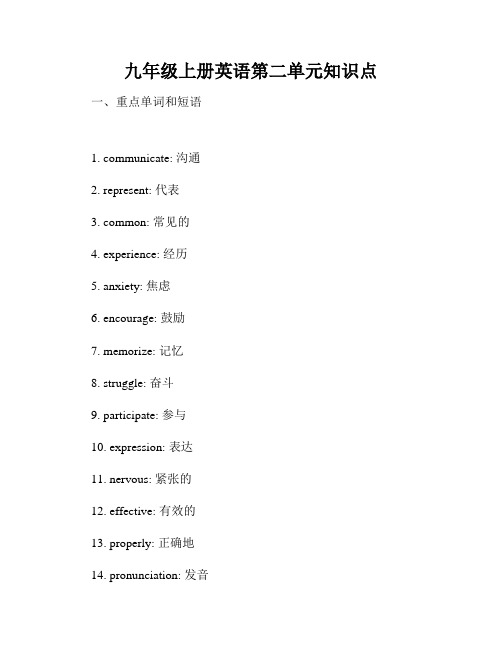
九年级上册英语第二单元知识点一、重点单词和短语1. communicate: 沟通2. represent: 代表3. common: 常见的4. experience: 经历5. anxiety: 焦虑6. encourage: 鼓励7. memorize: 记忆8. struggle: 奋斗9. participate: 参与10. expression: 表达11. nervous: 紧张的12. effective: 有效的13. properly: 正确地14. pronunciation: 发音15. progress: 进步二、重点语法1. 一般现在时:表示经常性、习惯性的动作或事实。
例如:She always gets up early.2. 现在进行时:表示现在进行的动作。
例如:They are playing basketball now.3. 一般过去时:表示过去发生的动作或状态。
例如:I saw a movie yesterday.4. 过去进行时:表示过去某一时刻正在进行的动作。
例如:She was studying when I called her.5. 一般将来时:表示将来要发生的动作或事件。
例如:We will visit Beijing next month.三、重点句型1. How do you communicate with your friends?你是如何与你的朋友沟通的?2. I usually talk to them on social media.我通常在社交媒体上与他们交谈。
3. English is important for communication.英语对于沟通来说很重要。
4. I have some experience in learning English.我在学习英语方面有一些经验。
5. Don't be nervous and just enjoy the process.不要紧张,尽情享受这个过程。
九年级上册英语第二单元2d部分知识点
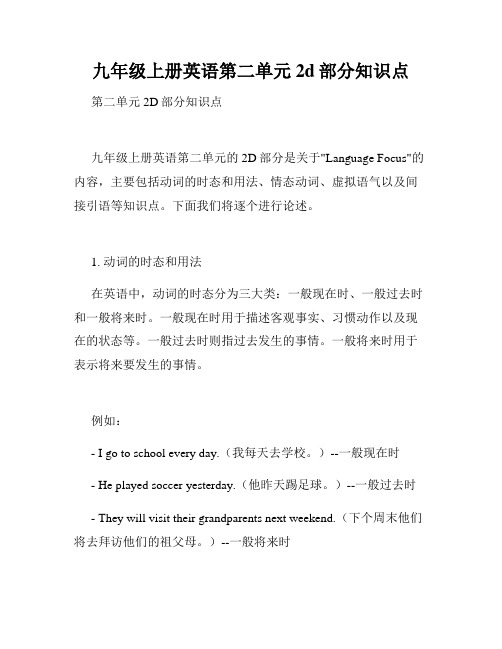
九年级上册英语第二单元2d部分知识点第二单元2D部分知识点九年级上册英语第二单元的2D部分是关于"Language Focus"的内容,主要包括动词的时态和用法、情态动词、虚拟语气以及间接引语等知识点。
下面我们将逐个进行论述。
1. 动词的时态和用法在英语中,动词的时态分为三大类:一般现在时、一般过去时和一般将来时。
一般现在时用于描述客观事实、习惯动作以及现在的状态等。
一般过去时则指过去发生的事情。
一般将来时用于表示将来要发生的事情。
例如:- I go to school every day.(我每天去学校。
)--一般现在时- He played soccer yesterday.(他昨天踢足球。
)--一般过去时- They will visit their grandparents next weekend.(下个周末他们将去拜访他们的祖父母。
)--一般将来时时态的使用要根据具体语境来进行判断,根据动作发生的时间来选择合适的时态。
2. 情态动词情态动词可以用来表示说话人对某个动作或状态的态度、推测、能力等。
常见的情态动词有can, could, may, might, must, shall, should, will, would等。
例如:- You can eat an apple.(你可以吃一个苹果。
)--表示能力- She may be at home.(她也许在家。
)--表示推测- They must study hard.(他们必须努力学习。
)--表示推测或义务情态动词的用法需要根据具体语境来判断,一般情态动词后面的动词使用原形。
3. 虚拟语气虚拟语气用来表示与事实相反的情况或者对现在或过去的假设、愿望、建议等。
虚拟语气包括过去虚拟语气和与过去事实相反的条件虚拟语气。
例如:- If I were you, I would study harder.(如果我是你,我会更加努力学习。
仁爱版九年级上册英语第二单元知识点总结

仁爱版九年级上册英语第二单元知识点总结一、重点词汇1. concentrate: 集中注意力2. progress: 进步3. technique: 技术,技巧4. motivate: 激励,鼓励5. challenge: 挑战6. memorize: 记住7. grammar: 语法8. structure: 结构9. dialogue: 对话10. pronunciation: 发音二、重点句型1. How can I improve my English quickly? (如何才能快速提高我的英语?)2. You should read more English books. (你应该多读英文书。
)3. Can you give me some advice on how to improve my listening skills? (你能给我一些建议如何提高我的听力技能吗?)4. It’s important to practice speaking with others. (和别人练习口语很重要。
)5. I think the best way to learn grammar is to do more exercises.(我认为学习语法的最好方法是做更多的练习。
)三、语法重点1. 时态的使用2. 被动语态的构成与运用3. 语法结构的灵活运用四、阅读技巧1. 注重文章中的关键词2. 注意上下文的逻辑关系3. 提高阅读速度和理解能力五、听力技巧1. 练习听力短文,提高听力技能2. 注意语速和语调的变化3. 注意听取关键信息六、口语表达1. 培养说英语的自信心2. 练习日常交际用语3. 学会模仿优秀的口语表达者,提高自己的口语水平4. 积极参与英语口语练习和交流七、写作技巧1. 多读范文,学习优秀的写作风格2. 学会使用连接词,提高文章的连贯性3. 多加练习,提高写作水平4. 注意语法和拼写错误的改正八、口语练习1. 找一个练习口语的伙伴,共同提高口语水平2. 参加英语角或者英语俱乐部,扩大口语交流的机会3. 每天坚持练习口语,保持口语水平的稳定提升九、总结本单元主要围绕着英语学习的各个方面展开,包括阅读、听力、口语、写作等方面的技巧和方法。
九年级上册英语第二单元笔记
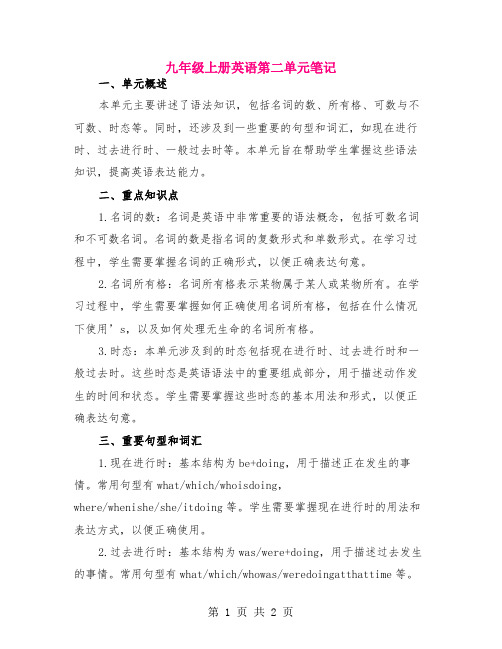
九年级上册英语第二单元笔记一、单元概述本单元主要讲述了语法知识,包括名词的数、所有格、可数与不可数、时态等。
同时,还涉及到一些重要的句型和词汇,如现在进行时、过去进行时、一般过去时等。
本单元旨在帮助学生掌握这些语法知识,提高英语表达能力。
二、重点知识点1.名词的数:名词是英语中非常重要的语法概念,包括可数名词和不可数名词。
名词的数是指名词的复数形式和单数形式。
在学习过程中,学生需要掌握名词的正确形式,以便正确表达句意。
2.名词所有格:名词所有格表示某物属于某人或某物所有。
在学习过程中,学生需要掌握如何正确使用名词所有格,包括在什么情况下使用’s,以及如何处理无生命的名词所有格。
3.时态:本单元涉及到的时态包括现在进行时、过去进行时和一般过去时。
这些时态是英语语法中的重要组成部分,用于描述动作发生的时间和状态。
学生需要掌握这些时态的基本用法和形式,以便正确表达句意。
三、重要句型和词汇1.现在进行时:基本结构为be+doing,用于描述正在发生的事情。
常用句型有what/which/whoisdoing,where/whenishe/she/itdoing等。
学生需要掌握现在进行时的用法和表达方式,以便正确使用。
2.过去进行时:基本结构为was/were+doing,用于描述过去发生的事情。
常用句型有what/which/whowas/weredoingatthattime等。
学生需要掌握过去进行时的用法和表达方式,以便在写作中正确使用。
3.一般过去时:基本结构为was/were+done或did+原形,用于描述过去发生的事情。
常用句型有what/which/whodid等。
学生需要掌握一般过去时的用法和表达方式,以便在口语和写作中正确使用。
4.词汇:本单元涉及到的词汇包括名词、动词、形容词等。
学生需要掌握这些词汇的拼写和用法,以便正确表达句意。
四、笔记总结本单元主要讲述了名词的数、所有格、时态等语法知识,以及一些重要的句型和词汇。
九年级上册英语第二单元知识点总结

九年级上册英语第二单元知识点总结Paragraph 1We should know some important words in this unit. For example, "stranger", it means a person that you don't know. And "relative", which refers to your family members like your parents, grandparents or cousins. Also, "put on" is different from "wear". "Put on" emphasizes the action of dressing, like "put on your coat", while "wear" just shows the state of having clothes on your body.Paragraph 2There are some useful phrases. "lay out" is one of them. We can say "My mother laid out a lot of delicious food on the table for the festival." Another phrase is "end up", for instance, "If you don't study hard, youwill end up failing the exam."Paragraph 3Grammar is important too. We learn about the use of infinitives. For example, "to do" can be used as a subject, like "To learn English well is not easy." It can also be used as an object, such as "I want to go to the park." And we should pay attention to the difference between the full infinitive and the bare infinitive in different situations.Paragraph 4When it comes to the reading part, we should learn how to get the main idea. We can find the topic sentence in each paragraph first. Sometimes, the first sentence or the last sentence of a paragraph may be the topic sentence. And we should also note some key words that can help us understand the passage better.Paragraph 5In the writing part, we can describe a festival. We should mention the time, the activities, the food and the meaning of the festival. For example, when writing about the Spring Festival, we can say it is in January or February. People clean their houses, have a big dinner together, set off fireworks and give red envelopes. It is a time for family reunion.。
九年级英语上册第二单元重要知识点总结【DOC范文整理】

九年级英语上册第二单元重要知识点总结Unit2一、知识点usedto过去常常做某事,暗指现在已经不存在的动作或状态.后跟动词原形.usedtodosth.Thereusedtobe….didn’tthere?否定形式为:didn’tuseto或usedn’tto疑问形式为:Did…useto…?或Used…to…?be/getusedtodoingsth.习惯于,to为介词.ear表示状态.=bein+颜色的词puton表示动作.dress+人给某人穿衣服.dresssb./oneselfhaveon表示状态onthesiteaon是…的成员,在…供职.Don’tyoureebere?否定疑问句.yes,Ido.不,我记得.No,Idon’t是的,我不记得了.反意疑问句:①陈述部分的主语为this,that,疑问部分主语用it;陈述部分主语用these,those,疑问部分用they做主语.例:Thisisanestory,isn’tit?Thoseareyourparents,aren’tthey?②陈述部分是therebe结构,疑问部分仍用there例:ThereasaannaedPaul,asn’tthere?③Ia后的疑问句,用aren’tI例:Iainclass2,aren’tI?④陈述部分与含有not,no,never,fe,little,hardly,seldo,neither,none等词时,疑问部分用肯定.例:Fepeopleliedthisovie,didn’tthey?但陈述句中若带有否定前缀或后缀的单词时,这个句子仍视为肯定,后面仍用否定.例:yoursisterisunhappy,isn’tshe?⑤陈述部分的主语若为不定式或V-ing短语,疑问部分主语用it.例:Tospendsouchoneyonclothesisunnecessary,isn’tit?⑥陈述句中主语是nobody,noone,everyone,everybody 等指人的不定代词时,疑问部分用they做主语;若陈述部分主语是soething,anything,noting,everything等指事物的不定代词时,疑问部分用it做主语.例:Nobodysaysoneordabouttheaccident,dothey?Everythingseesperfect,doesn’tit?⑦当主语是人称I时,若谓动为thin,believe,guess等词时,且其后跟宾丛,这时疑问句部分的人称,时态要与宾语从句保持一致,同时还要考虑否定转移.例:Idon’tthinhecanfinishtheorintie,canhe?⑧前面是祈使句,后用illyou?beterrifiedof害怕的程度比beafraidof深.iss:①思念,想念例:Ireallyisstheolddays.②错过,未中,未赶上,未找到.例:It’sapitythatyouissthebus.Theboyshotatthegoal,butissed.noore=not…anyore指次数;nolonger=not…anylonger指时间.right:①ad正确的,右边的②n.右方,权利③adv.直接地.0.Itseesthatyueihaschangedalot.=yueiseestohavechang edalot.1.afford+n./pron.afford+todo常与can,beableto连用.例:canyouaffordanecar?Thefilcouldn’taffordtopaysuchlargesalaries.asellas连词,不但…而且…强调前者.deaddeathdying playthepiano 弹钢琴①be/beeinterestedinsth.对…感兴趣②beinterestedindoingsth.对做…感兴趣③shogreatinterestin在……方面产生极大的兴趣④aplaceofinterest一处名胜soeplacesofinterest如:Heisinterestedinath,butheisn’tinterestedinspeaingEnglish.他对数学感兴趣,但是他对说英语不感兴趣。
九年级上册英语第二单元知识点梳理
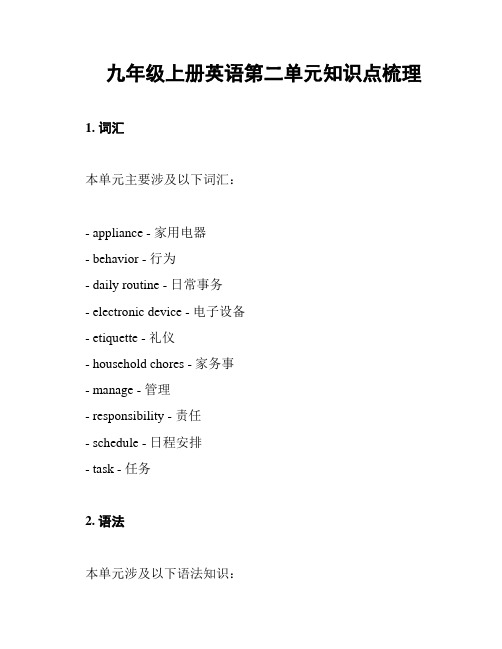
九年级上册英语第二单元知识点梳理1. 词汇本单元主要涉及以下词汇:- appliance - 家用电器- behavior - 行为- daily routine - 日常事务- electronic device - 电子设备- etiquette - 礼仪- household chores - 家务事- manage - 管理- responsibility - 责任- schedule - 日程安排- task - 任务2. 语法本单元涉及以下语法知识:- 现在进行时:用于描述正在进行的动作或状态。
- 句型结构:主语 + am/is/are + 动词 + -ing。
例如:- I am watching a movie now.- She is studying for the test.- They are playing football in the park.3. 口语表达在本单元中,我们研究了一些日常生活中的口语表达。
- How do you manage your time? - 你是如何管理时间的?- What are your daily responsibilities? - 你的日常责任是什么?- Can you help me with this task? - 你能帮我做这个任务吗?- I need to do my household chores. - 我需要做家务事。
- It's important to have good etiquette. - 有良好的礼仪很重要。
4. 情景对话本单元涉及以下情景对话:1. 在朋友家拜访的对话2. 家庭成员分担家务的对话3. 大家分享日常事务的对话4. 讨论日程安排的对话通过这些情景对话,我们可以研究如何运用所学的语言知识来进行实际交流。
以上是九年级上册英语第二单元的知识点梳理。
希望对你的学习有所帮助!。
九年级上册英语第二单元知识点总结
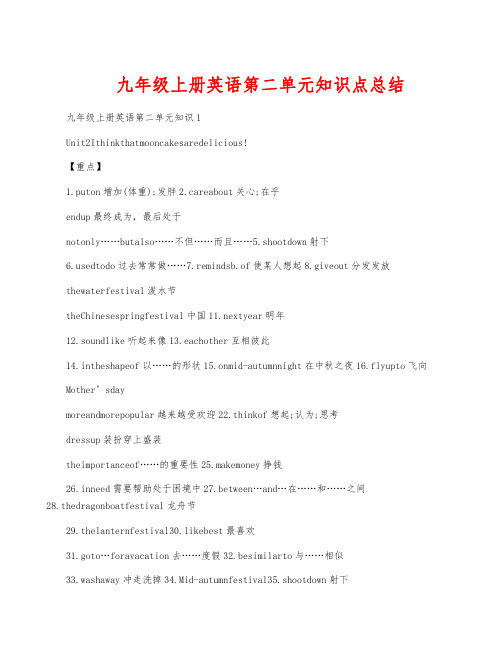
九年级上册英语第二单元知识点总结九年级上册英语第二单元知识1Unit2Ithinkthatmooncakesaredelicious!【重点】1.puton增加(体重);发胖2.careabout关心;在乎endup最终成为,最后处于notonly……butalso……不但……而且……5.shootdown射下edtodo过去常常做……7.remindsb.of使某人想起8.giveout分发发放thewaterfestival泼水节theChinesespringfestival中国11.nextyear明年12.soundlike听起来像13.eachother互相彼此14.intheshapeof以……的形状15.onmid-autumnnight在中秋之夜16.flyupto飞向Mother’sdaymoreandmorepopular越来越受欢迎22.thinkof想起;认为;思考dressup装扮穿上盛装theimportanceof……的重要性25.makemoney挣钱26.inneed需要帮助处于困境中27.between…and…在……和……之间28.thedragonboatfestival龙舟节29.thelanternfestival30.likebest最喜欢31.goto…foravacation去……度假32.besimilarto与……相似33.washaway冲走洗掉34.Mid-autumnfestival35.shootdown射下callout大声呼喊thetraditionof……的传统38.atnight在夜里;在晚上one…,theother…一个……,另一个…...Father’sday【重点句型】Ithinkthatthey’refuntowatch.我认为它们看着很有意思。
Whatdoyoulikeabout…?WhatdoyoulikebestabouttheDragonBoatFestival?关于,你最喜欢什么?Whatagreatday!多么美好的一天!4.1wonderif…Iwonderifit’ssimilartotheWaterFestivaloftheDaipeopleinYunnanProvince.我想知道它是否与云南傣族的泼水节相似。
- 1、下载文档前请自行甄别文档内容的完整性,平台不提供额外的编辑、内容补充、找答案等附加服务。
- 2、"仅部分预览"的文档,不可在线预览部分如存在完整性等问题,可反馈申请退款(可完整预览的文档不适用该条件!)。
- 3、如文档侵犯您的权益,请联系客服反馈,我们会尽快为您处理(人工客服工作时间:9:00-18:30)。
九年级上册英语第二单元知识点整理Unit2 I think that moon cakes are delicious!
【重点短语梳理】
1.put on增加(体重)发胖
2.care about关心在乎
3.end up最终成为,最后处于
4.not only……but also……不
但……而且……
5.shoot down射下
ed to do过去常常做……
7.remind sb.of使某人想起
8.give out分发发放
9.the water festival泼水节
10.the Chinese spring festival中国春节
11.next year明年
12.sound like听起来像
13.each other互相彼此
14.in the shape of以……的形状
15.on mid-autumn night在中秋之夜
16.fly up to飞向
y out摆开布置
e back回来
19.as a result结果因此
20.mother's day母亲节
21.more and more popular越来越受欢迎
22.think of想起认为思考
23.dress up装扮穿上盛装24.the importance of……的重要性
25.make money挣钱26.in need需要帮助处于困境中
27.between……and……在……和……之间28.the dragon boat festival龙舟节
29.the lantern festival元宵节30.like best最喜欢
31.go to……for a vacation去……度假32.be similar to与……相似
33.wash away冲走洗掉34.mid-autumn festival中秋节
35.shoot down射下36.call out大声呼喊
37.the tradition of……的传统38.at night在夜里在晚上
39.one……,the other……一个……,另一个…40.Father‘s day父亲节
41.have to必须不得不
42.play a trick on sb捉弄某人
43.the spirit of……的精神44.care about关心
45.wake up醒来46.the beginning of……的开始
【重要考点】
1.What+a(n)+形容词+可数名词的单数形式+主语+谓语+其他)!多么……的……!
2.How+形容词/副词(+主语+谓语+其他)!……多么……!
3.be going to将要/打算……
4.in+时间段在……后
5.give sb.sth.=give sth.to sb.给某人某物;把某物给某人
6.plan to do sth.计划做某事
7.refuse to do sth.拒绝做某事
8.one of+名词复数形式……之一
【重点语法】
一.宾语从句
宾语从句在复合句中作主句的宾语。
三大考点:引导词、时态和语序。
其中,语序必须是陈述句语序。
1.常由下面的一些词引导:
①由that引导,表示陈述意义,that可省略
He says(that)he is at home.他说他在家里。
②由if,whether引导,表示一般疑问意义(带有是否、已否、对否等)
I don’t know if/whether Wei Hua likesfish.我不知道韦华是否喜欢鱼。
③由连接代词、连接副词(疑问词)引导,表示特殊疑问意义
Do you know what he wants to buy?你知道他想要买什么吗?
2.从句时态要与主句一致
当主句是一般现在时,从句根据情况使用任何时态
当主句是一般过去时,从句应使用过去某时态(一般过去时,过去进行时,过去将来时,过去完成时)
He said(that)he was at home.他说他在家里。
I didn’t know that she was singing now.我不知道她正在唱歌。
She wanted to know if I had finished mhomework.她想要知道我是否已经完成了我的作业。
Did you know when he would be back?你知道他将会什么时候回来?
二.感叹句
感叹句是表达喜、怒、哀、乐以及惊奇、惊讶等强烈感情的句子。
感叹句通常由what或how引导。
现分述如下:
1.由what引导的感叹句,其句子结构可分为以下三种:
①可用句型:“What+a/an+形容词+可数名词单数+主语+谓语+其他!”。
如:What a nice present it is!它是一件多么好的礼物啊!
②可用句型:“What+形容词+可数名词复数+主语+谓语+其他!”。
如:What beautiful flowers they are!多么漂亮的花啊!
③可用句型:“What+形容词+不可数名词+主语+谓语+其他!”。
如:
What fine weather it is today!今天天气多好啊!
2.由how引导的感叹句,其句子结构也分为三种:
①可用句型:“How+形容词/副词+主语+谓语+其他!”。
如:
How careful she is!她多么细心啊!
How fast he runs!他跑得多快啊!
②可用句型:“How+形容词+a/an+可数名词单数+主语+谓语!”。
如:
How beautiful a girl she is!她是个多么漂亮的姑娘啊!
③可用句型:“How+主语+谓语!”。
如:
How time flies!光阴似箭!
3.由what引导的感叹句与由how引导的感叹句有时可以转换,但句中部分单词的顺序要有所变化。
如:
How beautiful a girl she is!=What a beautiful girl she is!
What delicious cakes these are!=How delicious these cakes are!。
